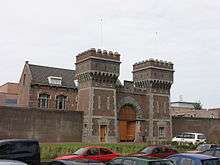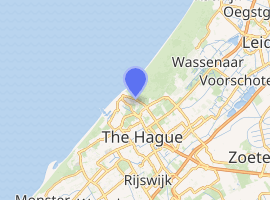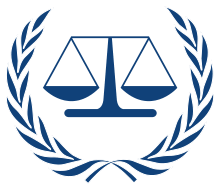People detained by the International Criminal Court
People detained by the International Criminal Court (ICC) are held in the ICC's detention centre, which is located within a Dutch prison in Scheveningen, The Hague. The ICC was established in 2002 as a permanent tribunal to prosecute individuals for genocide, crimes against humanity, war crimes, and the crime of aggression.[1] As of June 2018, it has issued public arrest warrants for 42 individuals, six of whom are currently in custody of the court.
The ICC detention centre is for holding people who have been charged with crimes, not for imprisoning convicted criminals.[2] As such, all detainees are considered innocent until their guilt has been proven.[2] Upon conviction by the ICC, criminals are transferred outside the Netherlands to serve their sentences.[2]
Detention centre
 | |

| |
| Location | Scheveningen, The Hague |
|---|---|
| Coordinates | 52.11061°N 4.301469°E |
| Capacity | 12 |
| Opened | 2006 |
| Managed by | The ICC registrar |
The ICC currently has twelve detention cells in a Dutch prison in Scheveningen, The Hague.[3] Suspects held by the International Residual Mechanism for Criminal Tribunals are held in the same prison and share some facilities, like the fitness room, but have no contact with suspects held by the ICC.[3]
The ICC registrar is responsible for managing the detention centre.[4] The rules governing detainment are contained in Chapter 6 of the Regulations of the Court[4] and Chapter 5 of the Regulations of the Registry.[5] The International Committee of the Red Cross (ICRC) has unrestricted access to the detention centre.[6]
Facilities
Each individual has his own toilet and washing area.[7] Each has access to a small gym and is offered training with a physical education instructor.[7]
Detainees are provided with meals, but they may also cook for themselves, purchase food from the prison shop, and have ingredients ordered in.[2][8] However, Charles Taylor's lawyers have complained that "the food which is served is completely eurocentric and not palatable to the African palate".[8]
Each detainee has a personal computer in his cell, on which he can view material related to his case.[2] They are offered computer training, if required,[2] and language courses.[7]
Detainees' rights
Detainees are allowed to communicate in private with their defence teams and diplomatic representatives of their countries of origin.[2] They are permitted visits from family members, spouses and partners, and spiritual advisors.[2]
List of detainees
The following table lists all the people who have been held at the ICC detention centre since it was established in 2006. The first person ever detained by the court was Thomas Lubanga, who arrived at the detention centre on March 17, 2006.[9]
Three former prisoners have been released or transferred, including Charles Taylor, who was tried in the Special Court for Sierra Leone. His trial was held at the ICC's facilities in The Hague because of political and security concerns about holding the trial in Freetown.[8][10]
| Name | Arrived | Departed | Notes | Ref. |
|---|---|---|---|---|
| Thomas Lubanga Dyilo | 16 March 2006 | 19 December 2015 | Sentence of 14 years' imprisonment. On 19 December 2015, he was transferred to a prison facility in the Democratic Republic of the Congo (DRC) to serve his sentence of imprisonment. | [11] |
| Charles Taylor | 20 June 2006 | 15 October 2013 | Tried by the Special Court for Sierra Leone, transferred to the United Kingdom to serve his sentence of 50 years' imprisonment[12] | [13] |
| Germain Katanga | 17 October 2007 | 19 December 2015 | Sentence of 12 years' imprisonment. On 13 November 2015, the Appeals Chamber reduced his sentence. The date for the completion of the sentence is set to 18 January 2016. On 19 December 2015, Germain Katanga was transferred to a prison facility in the Democratic Republic of the Congo (DRC) to serve his sentence of imprisonment. | [14] |
| Mathieu Ngudjolo Chui | 7 February 2007 | 21 December 2012 | Released following acquittal; appeal confirming previous sentence | [15] |
| Jean-Pierre Bemba | 3 July 2008 | 14 June 2018 | Sentenced to 18 years' imprisonment as of 21 June 2016. His war crimes conviction was overturned on June 8, 2018. He has one appeal remaining regarding witness tampering. | [16] |
| Callixte Mbarushimana | 25 January 2011 | 23 December 2011 | Released following dismissal of charges | [17] |
| Laurent Gbagbo | 30 November 2011 | — | Acquitted of charges. Case in appeal stage. | [18] |
| Bosco Ntaganda | 22 March 2013 | — | Case in trial stage | [19] |
| Aimé Kilolo Musamba | 25 November 2013 | 21 October 2014 | Case in appeal stage | [20] |
| Fidèle Babala Wandu | 25 November 2013 | 21 October 2014 | Case closed. He was sentenced in total to 6 months’ imprisonment. | [20] |
| Jean-Jacques Mangenda Kabongo | 4 December 2013 | 21 October 2014 | Case in appeal stage | [20] |
| Narcisse Arido | 18 March 2014 | 21 October 2014 | Case closed | [21] |
| Charles Blé Goudé | 22 March 2014 | — | Acquitted of charges. Case in appeal stage. | [22] |
| Dominic Ongwen | 21 January 2015 | — | Case in trial stage | |
| Ahmad al-Faqi al-Mahdi | 26 September 2015 | — | Pleaded guilty; sentenced to nine years' imprisonment on September 27, 2016 | [23][24] |
| al-Hassan Ag Abdoul Aziz | 31 March 2018 | — | Case in pre-trial stage | [25][26] |
| Radovan Karadžić | 20 March 2019 | — | Tried by the International Criminal Tribunal for the former Yugoslavia, sentenced to life imprisonment on 20 March 2019 | [27] |
References
- United Nations Department of Public Information (December 2002). The International Criminal Court. Retrieved on July 7, 2008.
- International Criminal Court (2007). "ICC Detention Centre" (PDF).. Retrieved on July 7, 2008.
- Emma Thomasson (February 28, 2006). ICC says cells ready for Uganda war crimes suspects Archived 2007-09-28 at the Wayback Machine. Reuters. Retrieved on July 7, 2008.
- International Criminal Court (May 26, 2004). "Regulations of the Court" (PDF). Archived from the original (PDF) on 2007-09-27., Chapter 6. Retrieved on July 7, 2008.
- International Criminal Court (September 25, 2006). "Regulations of the Registry" (PDF). Archived from the original (PDF) on 2007-10-29., Chapter 5. Retrieved on July 7, 2008.
- International Criminal Court (March 29, 2006). "Agreement between the International Criminal Court and the International Committee of the Red Cross on Visits to Persons deprived of Liberty Pursuant to the Jurisdiction of the International Criminal Court" (PDF). Archived from the original (PDF) on 2007-10-29., Article 4. Retrieved on July 7, 2008.
- International Criminal Court (April 2006). FAQ about detention put to Terry Jackson, Chief Custody Officer of the ICC Archived 2007-10-10 at the Wayback Machine. ICC Newsletter No. 7. Retrieved on July 7, 2008.
- Alexandra Hudson (May 31, 2007). Warlord Taylor's home is lonely Dutch prison. Reuters. Retrieved on July 7, 2008.
- International Criminal Court (March 17, 2006). First arrest for the International Criminal Court. Retrieved on July 7, 2008.
- BBC News (June 20, 2006). Q&A: Trying Charles Taylor. Retrieved on July 7, 2008.
- "The Prosecutor v. Thomas Lubanga Dyilo (ICC-01/04-01/06)". ICC. Retrieved 2013-12-04.
- "Charles Taylor Transferred to the UK for the Enforcement of his Sentence" (PDF). SCSL. 2013-10-15. Retrieved 2013-12-04.
- "ICC - The Special Court for Sierra Leone to use ICC Facilities for Trial of Charles Taylor". ICC. 2006-06-21. Retrieved 2013-12-04.
- "Germain Katanga found guilty of four counts of war crimes and one count of crime against humanity committed in Ituri, DRC". ICC. 2014-03-07. Retrieved 2014-03-07.
- "The Prosecutor v. Mathieu Ngudjolo Chui (ICC-01/04-02/12)". ICC. Retrieved 2013-12-04.
- "The Prosecutor v. Jean-Pierre Bemba Gombo (ICC-01/05-01/08)". ICC. Retrieved 2013-12-04.
- "The Prosecutor v. Callixte Mbarushimana (ICC-01/04-01/10)". ICC. Retrieved 2013-12-04.
- "The Prosecutor v. Laurent Gbagbo (ICC-02/11-01/11)". ICC. Archived from the original on 2013-12-17. Retrieved 2013-12-04.
- "The Prosecutor v. Bosco Ntaganda (ICC-01/04-02/06)". ICC. Retrieved 2013-12-04.
- "The Prosecutor v. Jean-Pierre Bemba Gombo, Aimé Kilolo Musamba, Jean-Jacques Mangenda Kabongo, Fidèle Babala Wandu and Narcisse Arido (ICC-01/09-01/13)". ICC. Retrieved 2013-12-04.
- "ICC-CPI-20140318-MA154: Initial appearance of Narcisse Arido scheduled for 20 March 2014". ICC. 2014-03-18. Retrieved 2014-03-18.
- "ICC-CPI-20140322-PR988: Charles Blé Goudé transferred to the ICC". ICC. 2014-03-22. Retrieved 2014-03-22.
- Situation in the Republic of Mali: The Prosecutor v. Ahmad Al Faqi Al Mahdi Archived 2016-08-03 at the Wayback Machine (last updated August 24, 2016).
- Ahmad al-Faqi al-Mahdi: The vandal of Timbuktu, BBC News (September 27, 2016).
- "Situation en République du Mali – Affaire – Le procureur c. Al Hassan Ag Abdoul Aziz Ag Mohamed Ag Mahmoud" [Situation in the Republic of Mali – Case – The prosecutor v. Al Hassan Ag Abdoul Aziz Ag Mohamed Ag Mahmoud] (PDF). International Criminal Court (in French). 2018-03-27. Archived (PDF) from the original on 2019-09-30. Retrieved 2019-09-30.
- "Situation in Mali: Al Hassan Ag Abdoul Aziz Ag Mohamed Ag Mahmoud surrendered to the ICC on charges of crimes against humanity and war crimes in Timbuktu". International Criminal Court. 2018-03-31. Archived from the original on 2019-09-30. Retrieved 2019-09-30.
- "Ex-Bosnian Serb wartime leader Karadzic given life in prison". Reuters. 2019-03-20. Retrieved 2019-03-20.
